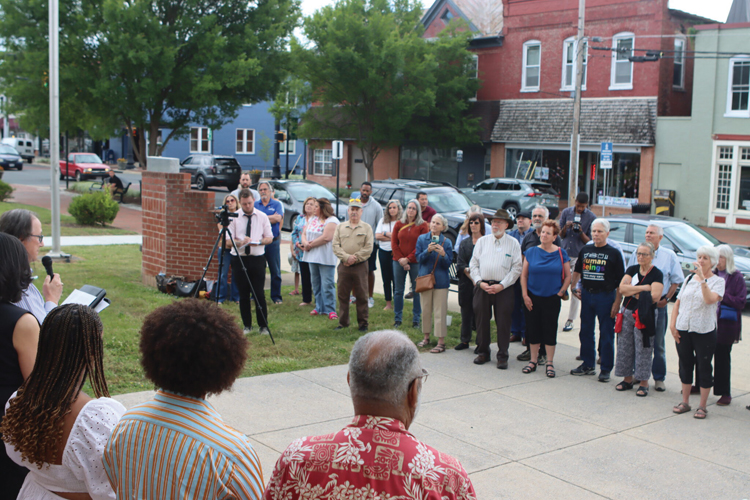NAACP sues Shenandoah over Confederate names
Nathaniel Cline | 6/13/2024, 6 p.m.

The Virginia NAACP on Tuesday filed a lawsuit against the Shenandoah County School Board for what it called “reaffirming discrimination,” after the school system voted to rebrand schools with Confederate names in May.
The lawsuit alleges that the school board violated the U.S. Constitution, Title VI of the Civil Rights Act of 1964 and the Equal Educational Opportunity Act. The plaintiffs seek to remove the Confederate names, mascots and vestiges and to prevent any future school naming involving Confederate leaders or references to the Confederacy.
On May 10, the Shenandoah County School Board reversed a 2020 decision by a previous board to rename two schools after Confederate Generals Turner Ashby, Robert E. Lee and Thomas “Stonewall” Jackson. In 2021, the schools on the division’s southern campus, which included North Fork Middle, were re-named from Stonewall Jackson High School to Mountain View, and Ashby-Lee Elementary School to Honey Run.

Shenandoah County Public Schools responded to a request for comment, but did not immediately provide remarks.
“This backward move has received a negative reaction all over the world, and the world is watching to see if this variety of the seeds of hate and disenfranchisement will take root and return Shenandoah County and the commonwealth of Virginia to the days when racial exclusion was the law of the land,” said the Rev. Cozy Bailey, president of the Virginia NAACP.
On Tuesday, Bailey, members of the state NAACP and their attorneys gathered with about 45 community members and students in front of the Shenandoah County Circuit Court to announce the legal action against the school board’s decision to restore Confederate names to the schools. It appears to be the first school district in the country to do so.
 A crowd gathers in front of the Shenandoah County Circuit Court on June 11 after the Virginia NAACP announced it has filed a lawsuit against the Shenandoah County School Board for allegedly “reaffirming discrimination” when it voted to return the original Confederate school names on May 10.
A crowd gathers in front of the Shenandoah County Circuit Court on June 11 after the Virginia NAACP announced it has filed a lawsuit against the Shenandoah County School Board for allegedly “reaffirming discrimination” when it voted to return the original Confederate school names on May 10.Photo by Nathaniel Cline/Virginia Mercury
Bailey described the board’s decision on May 10 as “cold-hearted” and reminiscent of the Jim Crow era. He said the organization is not trying to revise history, but is “chartering” a better path for the future by learning from the past and not making the same mistakes.
Some people, including a portion of Shenandoah residents who support the school names reversal, believe the Confederacy represents a heritage of Southerners’ courage against the federal Union while fighting for the rights of southern states.
Others, including civil rights groups and some Shenandoah students and families, view the Confederacy as defenders of slavery and a foundational part of America’s history of racism.
Between the 1950s and 1960s, local leaders in Shenandoah County named public schools after Confederate leaders.
Since that time, a movement to make schools more inclusive and equitable has advanced in courtrooms and through legislation at the state and federal levels. In recent years, localities statewide have made a concerted effort to address the commonwealth’s history of white supremacist ideology and historical practices of creating unfair advantages for white people by implementing policy changes and hosting community discussions on these topics.
Several Virginia communities renamed roads that bore the names of people connected to slavery and removed signs and symbols of the Confederacy, such as statues.
Attorneys from the Washington Lawyers’ Committee and Covington & Burling LLP are representing the plaintiffs —the NAACP and five current students in Shenandoah County Public Schools.
Marja Plater, senior counsel with the Washington Lawyers’ Committee for Civil Rights and Urban Affairs, said the Confederate generals believed deeply and fought to preserve the ideology of white supremacy.
“It is what these men are known for,” Plater said. “Honoring them is to honor the legacy of discrimination.”
According to Ashley Joyner Chavous, an attorney with Covington & Burling, the community was involved early in the process of pushing back against the renamed schools, before the legal team received assistance from families in the community and their “brave” children who stepped up to share their perspectives.
“We’ve only come to learn more, and we look forward to engaging with the community as we proceed in this meditation,” Chavous said.
The lawsuit was filed Tuesday in the Western District Court of Virginia in Harrisonburg. A judge and court date have not been set.
This story originally appeared at Virginia Mercury.com





